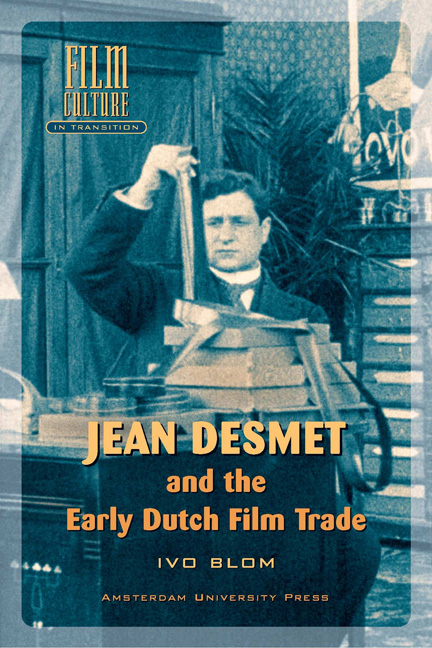Book contents
- Frontmatter
- Dedication
- Contents
- Preface
- Abbreviations, Unidentified Films and Historical Currencies
- Introduction
- I La Comète Belge: Jean Desmet’s Travelling Cinema, The Imperial Bio (1907-1910)
- II In The Beginning…: Film Distribution in the Netherlands Before Desmet
- III Gold Rush: In the Throes of Cinema Mania (1909-1914)
- IV Film Market Europe: Buying Films Abroad (1910-1914)
- V White Slave Girls and German Kultur: Film Rental and Distribution Strategies in the Netherlands (1910-1914)
- VI Onésime et Son Collègue: Competition (1910-1914)
- VII Das Ende vom Lied: The Impact of the First World War (1914-1916)
- VIII Quo Vadis?: Desmet’s Film Rental and Cinema Operation During the Great War (1914-1916)
- IX Afterlife: A New Career and the Beginning of a Collection
- X In Retrospect: Jean Desmet’s Place in Film History
- Notes
- Bibliography
- Photo Credits
- Film Culture in Transition
- Index of Film Titles
- General Index
- Frontmatter
- Dedication
- Contents
- Preface
- Abbreviations, Unidentified Films and Historical Currencies
- Introduction
- I La Comète Belge: Jean Desmet’s Travelling Cinema, The Imperial Bio (1907-1910)
- II In The Beginning…: Film Distribution in the Netherlands Before Desmet
- III Gold Rush: In the Throes of Cinema Mania (1909-1914)
- IV Film Market Europe: Buying Films Abroad (1910-1914)
- V White Slave Girls and German Kultur: Film Rental and Distribution Strategies in the Netherlands (1910-1914)
- VI Onésime et Son Collègue: Competition (1910-1914)
- VII Das Ende vom Lied: The Impact of the First World War (1914-1916)
- VIII Quo Vadis?: Desmet’s Film Rental and Cinema Operation During the Great War (1914-1916)
- IX Afterlife: A New Career and the Beginning of a Collection
- X In Retrospect: Jean Desmet’s Place in Film History
- Notes
- Bibliography
- Photo Credits
- Film Culture in Transition
- Index of Film Titles
- General Index
Summary
In 1986, the Italian diva film entitled FIOR DI MALE (FLOWER OF EVIL*, Cines 1915) was shown at the Giornate del Cinema Muto in Pordenone. It was a revelation. Paolo Cherchi Usai, the festival's organiser and head curator of film at George Eastman House in Rochester, recalls the event:
It was a declaration of war against the assumption that Italian cinema of the silent period was a known entity. It was the proof that much, much more could be seen and told about it. It was an indictment of the false representation and false consciousness of film history as a crystallized set of periodizations. […] It was nice to see the variety in the reaction of the audience: from sheer enthusiasm, to dismay for all the time we have lost following the ideology of the ‘great work’, to the diffidence and the sheer dismissal of those who certainly didn't want to have their theories and prejudices affected by the new evidence.
The established ‘canon’ of classic films and directors was sent into free fall by the screening of a film which, up to that moment, had simply been ignored by film history. Historians of Italian cinema, who had thought that there were no further surprises in store, were compelled to take another look at both their discipline and its prevailing paradigms.
Nor was this all. Historians and film archivists were also intrigued by the source of the film. For it turned out to be part of a private collection, consisting of almost 900 films, which had made its way into the Netherlands Film Museum in Amsterdam. Besides FIOR DI MALE, THE DUTCH collection contained hundreds of films no longer available in their countries of origin and unseen anywhere since completing their normal period of release. The presentation at Pordenone attracted the attention of European and American curators who came to the Netherlands to identify these films and to select them for festivals and regular exhibition. The films in the Desmet Collection offered an excellent impression of the sheer abundance of films available for ordinary, everyday exhibition in the period between 1907 and 1916.
Festival screenings and retrospectives made an immediate impact, and the Desmet films played an important role in the rewriting of film history.
- Type
- Chapter
- Information
- Jean Desmet and the Early Dutch Film Trade , pp. 19 - 36Publisher: Amsterdam University PressPrint publication year: 2003



